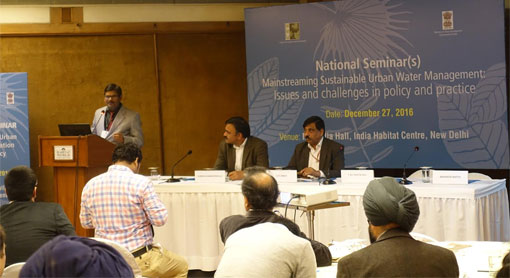CSE proposes novel policy framework for planning, designing and implementing best management practices on mainstreaming sustainable water & wastewater in India
-
Policy framework for water conservation/efficiency and energy efficiency will lead to making India a water frugal economy and meeting the Sustainable Development Goals (SDGs)
-
Strategies introduced to improve existing management models by working on demand management including usage of water efficient fixtures, reduction in non-revenue water (NRW) and also operation, maintenance and monitoring of these systems
-
Energy efficiency is not only for sustainable urban water management but also a tool for carbon mitigation in cities
-
Water sensitive urban design and planning approach can lead to mainstreaming intervention for water and resource efficiency leading us to becoming a water prudent society

New Delhi, December 27, 2016: Centre for Science and Environment (CSE) has proposed the first ever comprehensive policy framework for mainstreaming water conservation as well as energy efficiency in urban water and wastewater in India. This proposal was launched during a national seminar on “Mainstreaming Sustainable Urban Water Management: Issues and Challenges in policy and practice” organised by CSE in New Delhi. The seminar was attended by representatives of state and non-state agencies, including government representatives from the Ministry of Urban Development, Central Public Health and Environmental Engineering Organisation (CPHEEO), Bureau of Energy and Efficiency (BEE) and engineers and private consultants in the field of water and wastewater management in India.
Speaking at the seminar, Suresh Kumar Rohilla, Programme Director, CSE said that global freshwater availability has dramatically declined from 5177 cubic meters to 1869 cubic meters in the past 50 years, where India was declared ‘water stressed’ in the year 2011. He further stressed on the intensifying waste and water supply challenges of the existing 8000 urban centres in India, where the marginally poor sections of society will suffer the most. He also said that the need of the hour is to move towards a water frugal society. Only then can we talk about really becoming smart.
U.P. Singh, IAS, Additional Secretary Water Resources & National Mission for Clean Ganga (NMCG) pushed the need for understanding the challenge first before designing the solution and that the need of the hour is to plan holistically rather than adopting a narrow-framed approach. He added that water conservation is essential for Nirmal Dhara and Aviral Dhara for most of the rivers in India. He further stressed that building toilets alone would not solve the pollution problem, and that treatment and reuse of both septage and sewage becomes more critical.

V.K. Chaurasia, Advisor, CPHEEO highlighted the urgency of effectively and sustainably designing cities in the planning phase. He said that the Ministry of Urban Development has estimated that a fund of Rupees 18 lakh crores is required to address water supply and sanitation in India. Stressing on the importance of demand management, Chaurasia said that allocating this budget to water supply and sanitation in India is nearly impossible as there are other competing sectors that demand funds as well. He emphasised on capacitating Urban Local Bodies (ULBs) which are currently deficient in terms of skills and resources.
With regard to the solution for these challenges, Mahreen Matto, Programme Manager, CSE explained that the existing water management framework in India is conventional and orthodox, and is not sustainable. Matto highlighted the need to devise creative strategies to make the water management model in India more sustainable and more decentralised.
Steps Forward:
- Need to incorporate energy efficiency in planning and design stage of water supply and wastewater system by investing in solutions that have multiple benefits for multiple physical systems (water, wastewater, storm water, energy).
- Water conservation should be evaluated as a holistic approach to capitalise on technological improvement and omnipresent sources such as rainwater, treated wastewater with due cognizance to behavioural change.
- Water efficiency measure should include usage of water efficient fixtures, xeriscaping and reducing non-revenue water (NRW)
- Rainwater harvesting is another traditional yet effective way of improvement in supply of water resources by increasing the groundwater levels
- In-situ water augmentation needs to be considered through local recycle and reuse of wastewater and conservation and protection of water bodies
- Behavioural aspects of water conservation should demonstrate change in the mindset of communities towards saving water through awareness generation and water pricing regulation
- During the planning stage, a decentralised approach could be adopted for water and wastewater management that reduces dependency on energy intensive conveyance systems
- At every stage of water and wastewater management the use of energy efficient devices should be considered.
For more information on this, please contact Mahreen Matto, mahreen@cseindia.org, 98680180045
Share this article